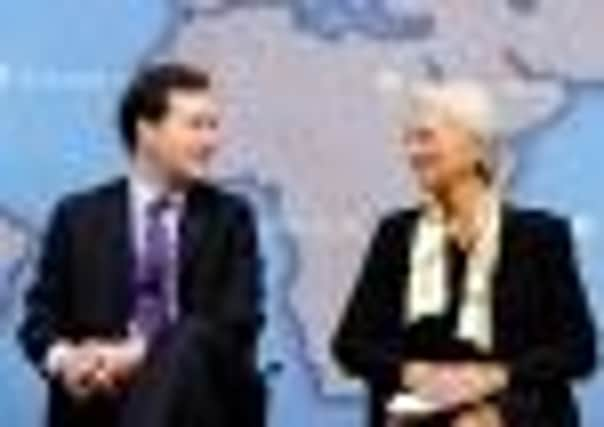Economic crisis fuels worldwide protests


The Chancellor, whose comments came after finance ministers from the powerful G20 countries held talks in Paris, insisted the European Union summit in Brussels would be a crucial moment in finding a “solution” to the problems.
He indicated that Britain would be open to providing more money to the International Monetary Fund – but not if it was only used to prop up the struggling single currency area.
Advertisement
Hide AdAdvertisement
Hide AdThe EU summit ended as protests against the economic crisis were held worldwide yesterday. In Rome, police fired teargas and water cannons to disperse demonstrators, some of whom had set fire to cars, broken shop and bank windows and clashed with officers during a protest against global economic policies.
The eurozone has set up a European financial stability facility (EFSF) worth £384 billion. But many economists believe a fund of about £1.75 trillion will be needed to fully reassure investors that banks would survive defaults by heavily-indebted countries such as Greece and Italy.
Final decisions are not likely to be taken until the main G20 meeting in Cannes next month.
However, there are hopes that the EU summit on 23 October will make significant progress on expanding the EFSF, as well as hammering out plans for a major write-down of Greek debt and a recapitalisation of weaker banks.
Osborne said: “We have heard from eurozone colleagues the action they are working on, but I think they will have left Paris under no misunderstanding that there is a huge amount of pressure on them to deliver a solution to the crisis.”
He went on: “The IMF should remain an institution focused on the global economy and supporting economies around the world, rather than creating a specific vehicle just to assist the Europeans.”
A statement issued at the end of the G20 meeting said ministers were “committed that the IMF must have adequate resources”.
Witnesses said the violence in Rome was caused by hooded radicals known as “black blocs”, who infiltrated the demonstration over the financial sector’s role in the global financial meltdown.
Advertisement
Hide AdAdvertisement
Hide AdFour cars were set on fire and the windows of several banks and shops were smashed along the route of the protest, one of many staged around the world to show solidarity with the Occupy Wall Street movement in the United States.
In London, hundreds gathered in the City to protest peacefully, and WikiLeaks founder Julian Assange made a rare public appearance to address the crowd.
The protests began in New Zealand, rippled east to Europe and returned to their starting point in New York. Demonstrations touched most European capitals and other cities.
In Auckland, New Zealand’s biggest city, 3,000 people chanted and banged drums, denouncing corporate greed.
In Sydney, about 2,000 people, including representatives of Aboriginal groups, communists and trade unionists, protested outside the central Reserve Bank of Australia.
Hundreds of people marched in Tokyo, including anti- nuclear protesters. More than 100 people gathered at the Taipei stock exchange. In Manila, a few dozen marched on the US embassy waving banners reading: “Down with US imperialism” and “Philippines not for sale”.